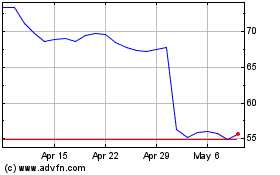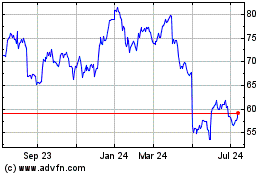CVS Warns of Surge in Non-Coronavirus Health Problems -- 2nd Update
May 06 2020 - 3:09PM
Dow Jones News
By Sharon Terlep
CVS Health Corp. executives warned Wednesday of an impending
surge in medical problems unrelated to coronavirus, as the pharmacy
chain's data suggest Americans are delaying routine health care
during the pandemic.
CVS, which owns insurance giant Aetna, says patients in April
received fewer new prescriptions, starting fewer new treatments and
seeing doctors less frequently, a concern especially for patients
who have chronic conditions such as diabetes and heart disease,
which can lead to costly hospitalizations when not treated
consistently.
Meantime, store and prescription sales dropped in April
following a pandemic-driven surge in business earlier in the year,
the company said. Aetna also saw a decline in commercial contracts
as businesses dropped insurance coverage for workers to cut costs,
laid off workers or closed.
The emerging trends follow a first quarter during which CVS had
higher sales as the pandemic prompted consumers to fill more
routine prescriptions and to spend more at the pharmacy chain's
stores.
The pandemic has led to dramatic shift in consumer patterns, the
company said. Virtual visits to the company's urgent-care clinic
grew sixfold while prescription home delivery grew 10-fold. Online
prescription refill requests grew 50%.
"We are seeing a new normal emerge," CVS CEO Larry Merlo said.
"We expect elements of today's new norm will become part of
tomorrow's everyday routines."
CVS's Aetna unit saw a drop-off of around 30% in use of
health-care services in April, as much of the health-care system
paused elective procedures to brace for coronavirus surges.
But Mr. Merlo said in an interview that the Aetna business has
picked up slightly in response to shelter-in-place orders being
lifted in certain locations. The company expects "the trough, the
low point will be in the second quarter, and we will see some
pickup in the second half of the year," but it is too soon to tell
how soon or how much, Mr. Merlo said.
While people weren't starting new drug therapies for health
conditions, Mr. Merlo said it appeared that patients with chronic
conditions were keeping up their existing prescriptions.
Prescription volume for the quarter ended March 31 grew more
than 8%, as customers rushed to stock up on medications amid the
pandemic, either by refilling prescriptions early or switching to
90-day prescriptions. Same-store sales grew 8% and shoppers scooped
up health-related items and other goods.
"We're uniquely positioned to understand consumer and patient
needs and how to address them," Mr. Merlo said in a statement.
CVS reported first-quarter net income of $2 billion, or $1.53 a
share, compared with $1.4 billion, or $1.09 a share, in the
comparable quarter a year before. Adjusted earnings were $1.91 a
share.
Analysts were looking for earnings of $1.22 a share, or $1.62 a
share on an adjusted basis.
CVS said its revenue rose 8.3% to $66.8 billion from the same
period the year before as revenue grew across all segments.
Analysts were targeting $64.1 billion.
Revenue in its retail segment, which fulfills prescription
medications and sells a range of merchandise, was $22.7 billion, up
7.7% compared with the year-earlier period. CVS has faced pressure
in its retail-pharmacy business but has begun to fare better than
rival Walgreens Boots Alliance Inc.
Walgreens also generated stronger-than-expected sales during its
latest quarter, though the company's operating income fell 19%, in
part because of reimbursement pressure on prescription drugs. Like
CVS, Walgreens said sales in April dropped off following a surge in
March.
CVS's health-care benefits business, which includes Aetna,
posted revenue of $19.2 billion, an increase of 7.4%. The company
last year sold its Medicare Part D prescription business to a
WellCare Health Plans Inc., but said it generated more revenue in
the quarter from government products.
Revenue grew 4.2%, to $35 billion, in the pharmacy-services
segment.
CVS said its expectations for full-year earnings and cash flow
remain unchanged while withdrawing guidance for all other metrics
due to uncertainty around coronavirus.
CVS shares were up nearly 1% in afternoon trading.
--Anna Mathews contributed to this article.
Write to Sharon Terlep at sharon.terlep@wsj.com
(END) Dow Jones Newswires
May 06, 2020 14:54 ET (18:54 GMT)
Copyright (c) 2020 Dow Jones & Company, Inc.
CVS Health (NYSE:CVS)
Historical Stock Chart
From Mar 2024 to Apr 2024

CVS Health (NYSE:CVS)
Historical Stock Chart
From Apr 2023 to Apr 2024
